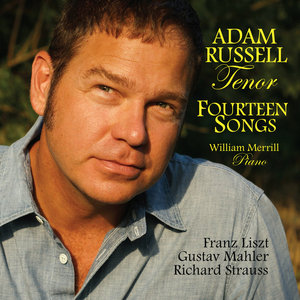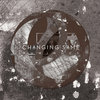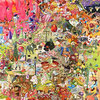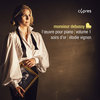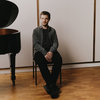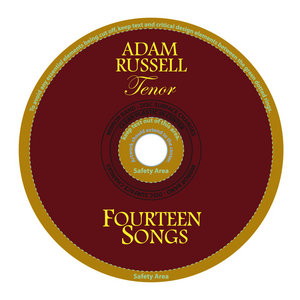Fourteen Songs by Adam Russell
Tracklist
| 1. | Oh! quand je dors | 4:20 |
| 2. | Benedetto sia'l giorno | 6:06 |
| 3. | Pace non trovo | 6:38 |
| 4. | Ich atmet' einem linden Duft! | 2:12 |
| 5. | Liebst du um Schönheit | 2:23 |
| 6. | Blicke mir nicht in die Lieder | 1:54 |
| 7. | Ich bin der Welt abhanden gekommen | 5:38 |
| 8. | Um Mitternacht | 6:17 |
| 9. | Ich trage meine Minne | 2:24 |
| 10. | Nacht | 2:28 |
| 11. | Cäcilie | 2:12 |
| 12. | Ruhe, meine Seele | 2:58 |
| 13. | Heimliche Aufforderung | 3:18 |
| 14. | Des Dichters Abendgang | 4:55 |
Credits
released March 23, 2018
One afternoon when walking in downtown Boston, I noticed some graffiti sprayed on the side of a building. It was high enough off the ground and of such scale that it made me think it was made by an artist. Three words read, “Follow Your Dreams,” but the slogan had a large red X through it.
In the not too distant past, fellow musicians have said to me things like, “You're the real deal; you're a real tenor.” Or, “Why aren't you out there singing?” Oddly enough, I have even been called Maestro. Another professional explained my own dead-endedness as if it reflected the nature of our times. “Tastes have changed. You should have been born thirty years ago,” or, “Yours is a sound from a bygone age.” Pros tell me they hear that “Italianate cry” in my voice with reference to the tenors of the past. In the world of opera that is a compliment; we revere the “golden age” of opera as we seek out the genesis of this musical art form. Despite the seeming egotism of actually writing these things myself, I hear professionals talk this way about my singing. “You're a world class voice. Why aren't you out there singing?” “Why aren't you singing at the Metropolitan Opera?” Such as it is! There isn’t room for everyone who enters the arts.
Even when you’ve given a hundred and ten percent of your energy to a specific end, things don’t always turn out as you expected. Not all dreams come true. Joseph Campbell’s adage to “follow your bliss” can lead some ships aground. Perhaps now I can adjust my expectations to measure my achievements in the cultivation of my talent itself instead of career accolades. As the holder of this gift, my skills have not waned. I make this recording as a historical document of my singing in its prime, whether it be heard by others or not. For me, this is an audible autobiography recorded with sound instead of written with words. It represents a personal journey in which music was a schoolmaster and a taskmaster—following the many twists and turns of my life. This album is a celebration of the years I have spent developing my voice, learning to sing difficult music under the scrutiny of the public, the pains, the sweat, the sorrows, the disappointments—and the kinetically euphoric high of making these sounds with my own body as my instrument, of having my voice heard ringing into an open space.
Instead of opera arias with orchestral reductions arranged for piano, I have chosen songs originally written for piano and voice. The music isn’t chosen around any theme—which is conventional when programing art song—but songs that are substantial and require a level of virtuosity. And thus I have selected a straightforward rather than romantic title for the album, "Fourteen Songs." The collection concludes with "Des Dichters Abendgang," as the culmination of this album because of its spiritual sentiment. In the song one having a vision sees through the veil into the halls of a temple in which what is holy “surges.” After the vision closes the seer carries in his heart the remembrance of what was experienced. “The light that thou hast seen today will shine on thee in darkest places.”
One afternoon when walking in downtown Boston, I noticed some graffiti sprayed on the side of a building. It was high enough off the ground and of such scale that it made me think it was made by an artist. Three words read, “Follow Your Dreams,” but the slogan had a large red X through it.
In the not too distant past, fellow musicians have said to me things like, “You're the real deal; you're a real tenor.” Or, “Why aren't you out there singing?” Oddly enough, I have even been called Maestro. Another professional explained my own dead-endedness as if it reflected the nature of our times. “Tastes have changed. You should have been born thirty years ago,” or, “Yours is a sound from a bygone age.” Pros tell me they hear that “Italianate cry” in my voice with reference to the tenors of the past. In the world of opera that is a compliment; we revere the “golden age” of opera as we seek out the genesis of this musical art form. Despite the seeming egotism of actually writing these things myself, I hear professionals talk this way about my singing. “You're a world class voice. Why aren't you out there singing?” “Why aren't you singing at the Metropolitan Opera?” Such as it is! There isn’t room for everyone who enters the arts.
Even when you’ve given a hundred and ten percent of your energy to a specific end, things don’t always turn out as you expected. Not all dreams come true. Joseph Campbell’s adage to “follow your bliss” can lead some ships aground. Perhaps now I can adjust my expectations to measure my achievements in the cultivation of my talent itself instead of career accolades. As the holder of this gift, my skills have not waned. I make this recording as a historical document of my singing in its prime, whether it be heard by others or not. For me, this is an audible autobiography recorded with sound instead of written with words. It represents a personal journey in which music was a schoolmaster and a taskmaster—following the many twists and turns of my life. This album is a celebration of the years I have spent developing my voice, learning to sing difficult music under the scrutiny of the public, the pains, the sweat, the sorrows, the disappointments—and the kinetically euphoric high of making these sounds with my own body as my instrument, of having my voice heard ringing into an open space.
Instead of opera arias with orchestral reductions arranged for piano, I have chosen songs originally written for piano and voice. The music isn’t chosen around any theme—which is conventional when programing art song—but songs that are substantial and require a level of virtuosity. And thus I have selected a straightforward rather than romantic title for the album, "Fourteen Songs." The collection concludes with "Des Dichters Abendgang," as the culmination of this album because of its spiritual sentiment. In the song one having a vision sees through the veil into the halls of a temple in which what is holy “surges.” After the vision closes the seer carries in his heart the remembrance of what was experienced. “The light that thou hast seen today will shine on thee in darkest places.”
